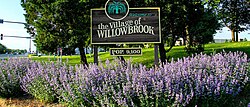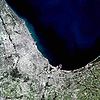Willowbrook, DuPage County, Illinois
Willowbrook | |
|---|---|
Village | |
| Village of Willowbrook | |
 Willowbrook, Illinois' Welcome Sign on IL-83 | |
 Location of Willowbrook in DuPage County, Illinois. | |
| Coordinates: 41°46′2″N 87°56′57″W / 41.76722°N 87.94917°W | |
| Country | |
| State | Illinois |
| County | DuPage |
| Township | Downers Grove |
| Incorporated | 1960 |
| Government | |
| • Type | Mayor-trustee |
| • Mayor | Frank A. Trilla |
| • Village Clerk | Leroy Hansen |
| Area | |
• Total | 2.63 sq mi (6.80 km2) |
| • Land | 2.57 sq mi (6.66 km2) |
| • Water | 0.05 sq mi (0.14 km2) 2.18% |
| Population (2020) | |
• Total | 9,236 |
| • Density | 3,590.98/sq mi (1,386.54/km2) |
| Standard of living | |
| • Per capita income | $37,715 (median: $56,725) |
| • Home value | $216,000 (median: $245,800 (2000)) |
| ZIP code(s) | 60527 |
| Area code(s) | 630 and 331 |
| Geocode | 80645 |
| FIPS code | 17-81919 |
| GNIS feature ID | 2399702 |
| Website | www |
Willowbrook is a village in DuPage County, Illinois, United States, in the Chicagoland area. Per the 2020 census, the population was 9,236.[2] It is a southwestern suburb of Chicago.
History

Originally an unincorporated area of nearby Darien, Willowbrook grew from the Ridgemoor subdivision. It was named after a Grove of Willows along a local creek, which flows into Waterfall Glen. It was incorporated as a village in 1960[3] Construction of U.S. Route 66 along Willowbrook's south edge led to the development of several new gas stations and restaurants. In 1946, Ervin "Irv" Kolarik opened Dell Rhea's Chicken Basket on Route 66. The restaurant became a staple in the community. It continues to operate as one of the last surviving stops on Route 66 in Illinois. The building is listed on the National Register of Historic Places.
In the 1980's, new development began along IL-83 and I-55 as the village population continued to grow. In 1990, a swampy pond along Route 83, was cleaned up and designated as "Willow Pond". A trail has since been built around the pond, and it is known as a popular Ice skating spot during the winter season.[4]
Geography
The Village of Willowbrook is located at 41°46′2″N 87°56′57″W / 41.76722°N 87.94917°W (41.767153, -87.949281).[5]
According to the 2021 census gazetteer files, Willowbrook has a total area of 2.63 square miles (6.81 km2), of which 2.57 square miles (6.66 km2) (or 97.94%) is land and 0.05 square miles (0.13 km2) (or 2.06%) is water.[6] Willowbrook is around 23 miles (37 km) from Chicago. It is bordered by the suburban villages of Hinsdale, Westmont, Clarendon Hills, Burr Ridge, and Darien, along with unincorporated areas of DuPage County.
Demographics
| Census | Pop. | Note | %± |
|---|---|---|---|
| 1960 | 157 | — | |
| 1970 | 1,457 | 828.0% | |
| 1980 | 4,953 | 239.9% | |
| 1990 | 8,598 | 73.6% | |
| 2000 | 8,967 | 4.3% | |
| 2010 | 8,540 | −4.8% | |
| 2020 | 9,236 | 8.1% | |
| U.S. Decennial Census[7] 2010[8] 2020[9] | |||
As of the 2020 census[10] there were 9,236 people, 3,916 households, and 2,337 families residing in the village. The population density was 3,517.14 inhabitants per square mile (1,357.98/km2). There were 4,509 housing units at an average density of 1,717.06 per square mile (662.96/km2). The racial makeup of the village was 71.77% White, 4.48% African American, 0.30% Native American, 14.63% Asian, 0.03% Pacific Islander, 2.75% from other races, and 6.03% from two or more races. Hispanic or Latino of any race were 7.94% of the population.
There were 3,916 households, out of which 19.0% had children under the age of 18 living with them, 51.61% were married couples living together, 7.02% had a female householder with no husband present, and 40.32% were non-families. 35.29% of all households were made up of individuals, and 14.89% had someone living alone who was 65 years of age or older. The average household size was 2.82 and the average family size was 2.17.
The village's age distribution consisted of 15.0% under the age of 18, 7.1% from 18 to 24, 24.5% from 25 to 44, 28.9% from 45 to 64, and 24.6% who were 65 years of age or older. The median age was 48.8 years. For every 100 females, there were 81.7 males. For every 100 females age 18 and over, there were 77.5 males.
The median income for a household in the village was $86,364, and the median income for a family was $117,415. Males had a median income of $65,748 versus $45,833 for females. The per capita income for the village was $54,805. About 5.0% of families and 5.4% of the population were below the poverty line, including 4.9% of those under age 18 and 9.3% of those age 65 or over.
| Race / Ethnicity (NH = Non-Hispanic) | Pop 2000[11] | Pop 2010[8] | Pop 2020[9] | % 2000 | % 2010 | % 2020 |
|---|---|---|---|---|---|---|
| White alone (NH) | 7,348 | 6,378 | 6,486 | 81.94% | 74.68% | 70.23% |
| Black or African American alone (NH) | 213 | 400 | 407 | 2.38% | 4.68% | 4.41% |
| Native American or Alaska Native alone (NH) | 3 | 4 | 7 | 0.03% | 0.05% | 0.08% |
| Asian alone (NH) | 890 | 1,151 | 1,333 | 9.93% | 13.48% | 14.43% |
| Pacific Islander alone (NH) | 3 | 2 | 3 | 0.03% | 0.02% | 0.03% |
| Other race alone (NH) | 5 | 9 | 12 | 0.06% | 0.11% | 0.13% |
| Mixed race or Multiracial (NH) | 123 | 109 | 255 | 1.37% | 1.28% | 2.76% |
| Hispanic or Latino (any race) | 382 | 487 | 733 | 4.26% | 5.70% | 7.94% |
| Total | 8,967 | 8,540 | 9,236 | 100.00% | 100.00% | 100.00% |
High cancer rates
In September 2018, the Illinois Department of Public Health began a cancer incidence study based on the recommendation of the Agency for Toxic Substances and Disease Registry.[12] The Willowbrook area shows a '300 in a million' cancer risk based on the 2014 National Air Toxics Assessment, far higher than neighboring communities with a '40 in a million' cancer incidence.[13] A local facility, Sterigenics International, Inc., uses a 'probable carcinogen' called Ethylene Oxide to sterilize medical equipment. According to the EPA fact sheet, 'Long-term exposure to ethylene oxide can irritate the eyes, skin, nose, throat, and lungs, and harm the brain and nervous system (causing effects such as headaches, memory loss, numbness). Studies show that breathing air containing elevated ethylene oxide levels over many years increases the risk of some types of cancers, including cancers of the white blood cells (such as non-Hodgkin's lymphoma, myeloma and lymphocytic leukemia); and breast cancer in females.' [14] On September 30, 2019, Sterigenics announced the closing of the Willowbrook facility eliminating key source of cancer causing chemical.[15]
References
- ^ "2020 U.S. Gazetteer Files". United States Census Bureau. Retrieved March 15, 2022.
- ^ "Willowbrook village, Illinois". United States Census Bureau. Retrieved April 15, 2022.
- ^ Willowbrook, Illinois (city-data.com)
- ^ "Willowbrook, IL". www.encyclopedia.chicagohistory.org. Retrieved February 17, 2024.
- ^ "US Gazetteer files: 2010, 2000, and 1990". United States Census Bureau. February 12, 2011. Retrieved April 23, 2011.
- ^ "Gazetteer Files". Census.gov. United States Census Bureau. Retrieved June 29, 2022.
- ^ "Decennial Census of Population and Housing by Decades". US Census Bureau.
- ^ a b "P2 Hispanic or Latino, and Not Hispanic or Latino by Race – 2010: DEC Redistricting Data (PL 94-171) – Willowbrook village, Illinois". United States Census Bureau.
- ^ a b "P2 Hispanic or Latino, and Not Hispanic or Latino by Race – 2020: DEC Redistricting Data (PL 94-171) – Willowbrook village, Illinois". United States Census Bureau.
- ^ "Explore Census Data". data.census.gov. Retrieved June 28, 2022.
- ^ "P004: Hispanic or Latino, and Not Hispanic or Latino by Race – 2000: DEC Summary File 1 – Willowbrook village, Illinois". United States Census Bureau.
- ^ "Illinois Department of Public Health (IDPH) to Perform Cancer Incidence Study". WillowbrookIL.org. Retrieved September 20, 2018.
- ^ "2014 National Air Toxics Assessment". EPA.gov. Retrieved September 20, 2018.
- ^ "Fact Sheet: EPA Taking Steps to Address Emissions of Ethylene Oxide". EPA.gov. Retrieved September 20, 2018.
- ^ "Sterigenics is leaving Willowbrook, eliminating key source of cancer-causing ethylene oxide in Chicago's western suburbs". Chicago Tribune.


